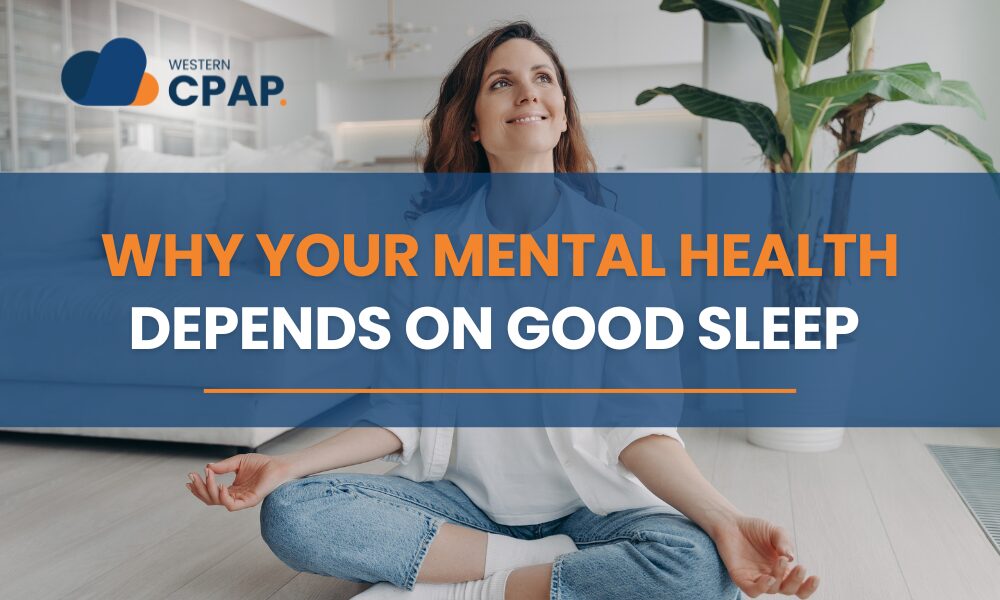- Free Shipping Options Available On Orders Over $300
- Price Match Guarantee
- FAQ
Why Your Mental Health Depends on Good Sleep
In today’s fast-paced world, we often underestimate the importance of sleep in maintaining our overall wellbeing. However, the truth is that proper sleep is crucial for both our physical and mental health.
At Western CPAP, we are in the sleep game and are solely focused on helping our clients get the best sleep possible. Let’s explore why your mental health depends on good sleep and how prioritising quality sleep can significantly improve your overall wellbeing.
Understanding the Science of Sleep and Mental Health
The intricate relationship between sleep and mental health reveals a fascinating interplay that’s crucial for our wellbeing. During those precious hours of slumber, our bodies embark on a restorative journey, engaging in processes essential for a healthy mind. It’s a time when our brain busies itself with organising memories, sifting through the day’s experiences, and balancing our emotions.
Scientific research sheds light on how adequate, quality sleep acts enhances our ability to concentrate, make informed decisions, and handle stress with grace. It’s during sleep that our brain undergoes a sort of maintenance, clearing out the mental clutter and emotional baggage that can weigh heavily on us if left unchecked.
This nightly reset is pivotal for our cognitive functions, playing a key role in how we process information, navigate the complexities of daily life, and maintain a healthy emotional equilibrium. The profound impact of sleep on our mental state cannot be overstressed; it’s as if each night, we’re given a chance to reset our emotional dials, preparing us for whatever the next day holds with a clearer mind and a steadier heart.
Embracing the science behind sleep and mental health not only illuminates the importance of catching those Z’s but also encourages us to prioritise sleep as a fundamental pillar of our mental wellbeing. As we delve deeper into understanding this vital connection, it becomes clear that ensuring a good night’s sleep is not just beneficial—it’s essential for fostering a resilient, healthy mind.
The Consequences of Neglecting Sleep on Your Mental Wellbeing
Ignoring the vital need for ample rest carries a hefty price for our mental wellbeing. When we consistently skimp on sleep, we’re not just facing a day of yawning and longing for naps; we’re potentially opening the door to more severe mental health challenges. Chronic sleep deprivation is intricately linked with heightened risks of falling into the grips of anxiety, depression, and a spectrum of mood disorders that can deeply affect our quality of life.
But the impact doesn’t stop there. Our cognitive functions take a hit as well. Struggling to focus, grappling with memory lapses, and finding it harder to learn new things are just the tip of the iceberg. It’s like operating in a fog, where every mental task feels more daunting and draining than it should.
The emotional toll of missed sleep can’t be overlooked. It’s not unusual to find that on days following poor sleep, the smallest irritants can feel insurmountable, and our capacity for patience and understanding towards others and ourselves can dramatically diminish. This emotional fragility not only strains personal and professional relationships but also undermines our ability to navigate day-to-day challenges with our usual resilience and perspective.
In shedding light on these consequences, the aim isn’t to alarm, but to underline the critical role sleep plays in our mental ecosystem. It’s a gentle reminder that by honouring our need for rest, we’re not indulging – we’re investing in our mental health and ensuring we’re primed to meet the demands of our lives with strength and clarity.
How Quality Sleep Supports Emotional Regulation and Resilience
Navigating the ebb and flow of emotions throughout our day requires a steady foundation of resilience and the ability to regulate our reactions, both of which are significantly bolstered by a good night’s rest. Adequate sleep furnishes us with the mental clarity and emotional balance needed to face life’s ups and downs with poise and perspective.
When our heads hit the pillow and we journey into the land of dreams, our brains are hard at work processing the emotional experiences of the day, making sense of them, and resetting our emotional compass. This nocturnal processing is vital for emotional resilience, allowing us to wake refreshed and ready to tackle new challenges with a calm and measured response.
Without this restorative period, our emotional responses can become distorted, leading to increased irritability and susceptibility to stress. This can set off a domino effect, where each minor setback feels insurmountable, clouding our judgement and dampening our spirits. By ensuring we allocate enough time for rest, we empower ourselves to maintain a healthier emotional outlook, improving our interactions with others and our ability to navigate the complexities of daily life with agility and optimism.
In essence, prioritising sleep is akin to investing in our emotional toolkit, equipping us with the resilience to bounce back from setbacks and the regulation needed to enjoy a harmonious, balanced life.
Practical Tips for Improving Sleep Quality for Better Mental Health
Enhancing your sleep quality doesn’t have to be a difficult task. With a few simple adjustments to your daily routine, you can pave the way for a restful night that supports your mental health.
- Start by establishing a regular sleep pattern, aiming to hit the sack and rise at consistent times, even on weekends. This helps regulate your body’s internal clock, leading to easier sleep onset and improved sleep quality.
- Create a serene pre-sleep ritual can also work wonders. Whether it’s a warm bath, reading a book, or practising mindfulness exercises, find what soothes you and make it a staple of your night time routine. This signals to your brain that it’s time to shift gears from the day’s hustle and bustle to a more tranquil state.
- Be mindful of your intake of stimulants like caffeine, particularly in the hours leading up to bedtime, as these can hinder your ability to fall asleep. Similarly, reducing screen time before bed can combat the disruptive effects of blue light on your sleep-wake cycle.
- Optimising your sleeping environment can significantly impact sleep quality. Ensure your bedroom is a sanctuary for sleep: quiet, cool, and dark. Investing in a comfortable mattress and pillows can also make a world of difference.
By integrating these practical tips into your routine, you’re not just investing in better sleep but also nurturing your mental wellbeing.
Prioritise Your Mental Wellbeing with Western CPAP
The importance of quality sleep for mental health cannot be overstated. At Western CPAP, we recognise this crucial connection and are committed to helping you achieve the rest you need for a healthier mind. By understanding the science behind sleep and mental health, we can begin to prioritise rest as a fundamental pillar of self-care. Ignoring this need not only affects our ability to concentrate, make decisions, and manage stress but also increases the risk of developing anxiety, depression, and other mood disorders.
However, by making simple adjustments to our daily routines and environment, we can enhance our sleep quality and, in turn, bolster our emotional resilience and regulation. Establishing consistent sleep patterns, cultivating pre-sleep rituals, and optimising our sleeping environment are just a few steps we can take to invest in our mental wellbeing.
If you’re ready to prioritise your mental health through quality sleep, contact us on (08) 6186 1856 or visit our website. Together, we can start on a journey towards better sleep and a brighter, more resilient mindset.





